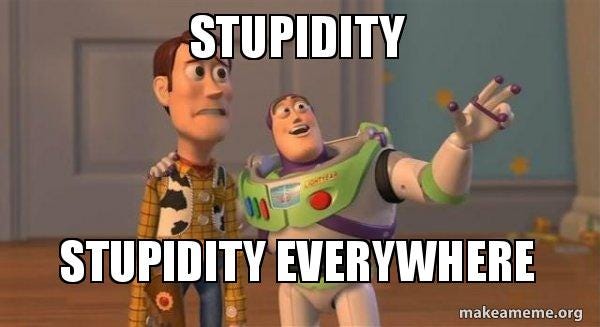How human stupidity changes at scale
People are stupid. When you get enough of them together, they get less stupid in some ways, and more stupid in other ways.
One time, when my little brother was in high school, he explained to me and my friends how he walks to school. His explanation was so dumb that my friends and I burst out laughing.
Basically, he would walk one block east, one block south, and then cut across the intersection diagonally, over and over again.
I asked him why he did this. It was faster, he said, because you get to go diagonally. It shaves a few seconds off your journey.
This was a stupid explanation, because there was literally an entire park and baseball field on his way to school that were almost always empty. He could save way more time by cutting diagonally through the park and the baseball field. (That would also eliminate the need to run through a busy intersection 10 times a day.)
But for some reason, when we told my brother, "hey, why don't you do it this way instead?", he got angry and refused to listen.
The stupidity of one person by themselves
I'm picking on my brother here because he popped into my mind, and because he's my little brother so I'm allowed to pick on him. But he's not the only one who does dumb idiosyncratic stuff. Everybody does dumb idiosyncratic stuff.
Why? A few reasons. First, everybody on Earth has a bunch of false beliefs.
False Beliefs
An example of a false belief: I personally used to believe, and still partially believe, that all of polite society is my enemy because I think differently from them.
Some more examples: a lot of people believe that they can’t get a girlfriend because they’re too short, or that all rich people are evil, or that the moon landing was faked, or something just as crazy.
The human brain has a way of warping reality. This is why we have stuff like financial bubbles and witch burnings: those happen when we all share the same collective delusion. And in addition to collective delusions, we also have private delusions.
Once we delude ourselves, we start seeing evidence that “proves” our delusion everywhere. For example, take people who believe the Earth is flat. To them, the whole existence of Antarctica — this whole continent that nobody ever goes to — is proof positive that something's being hidden from them. In their mind, the whole reason why we're discouraged from going to Antarctica is because that's where the edge of the world is.
Even the stuff that should disprove their false beliefs becomes more proof. For example, they see all of the photos of Earth from space as proof that there's a grand conspiracy to cover up the Earth being flat.
The same thing goes for other false beliefs. If you think that no one loves you and all of society is out to get you, your brain will make up evidence for it everywhere. Anytime somebody cuts you off on your way to work or gives you an angry look, you interpret it as evidence that you're right, and it makes you even more delusional.

The benefit of large groups of people is that these dumb beliefs tend to average out. If you form a startup with your friends Milo, John, and Bobby, and you believe the Earth is flat, Milo believes that the moon landing was faked, John believes that the world is controlled by a small handful of Jews, and Bobby believes that birds are actually government surveillance drones, 3 out of 4 of you still have the normal opinion on each issue, so majority rule still works. Your idiosyncrasies average out in the group.
In addition, large groups of people can call each other out on their dumb beliefs. If you think you can’t get a girlfriend because you’re too short, your short friend with a sexy girlfriend can tell you that no, actually, your social skills are the biggest problem, and if you fix those there are lots of women who would want to date you. But if you're by yourself, or you never talk about your dating life with anybody, no one will tell you that you're wrong.
Motivation
Another reason why individuals on their own can sometimes be stupid is because they have less motivation to be smart.
When I do marketing work for my clients, I hit my deadlines and I try my very best, because otherwise my client will be unhappy. It's much harder for me to work on my own business, because I don't feel any external pressure.
A lot of people's motivation comes from what other people will think about them. When people do stuff by themselves, there's no outside world to judge them, which can make progress go way slower.
Not Knowing Stuff
The final reason why one person is gonna usually be stupid by themselves is because one person just can’t know everything by themselves.
I try hard to know as much stuff as I can by reading as many books as I can, building as many skills as I can, and experiencing as many things as I can — but even if I kept at this for the next 300 years, I would still only know less than one percent of publicly available information.
This can become a big problem. Right now, I’m working on building a couple online businesses. To do so, I need to understand how a dozen or so different marketing platforms, softwares, and tactics. If I am not an expert in all of them, I will make dumb mistakes. And I cannot possibly become an expert in all of them without spending years studying each of them — by which time the industry will have changed and much of my knowledge will be rendered useless. So unless I hire somebody else, I have to settle for doing a few things suboptimally.
In a large corporation, you wouldn’t have this problem. You'd hire one guy to do Facebook ads, one guy to do Google ads, one guy to do SEO, one guy to do email marketing, et cetera. But I have to do all those things for my own businesses, and I'm only good at one of them.
The stupidity of large groups
Large groups of people are also stupid, but in different ways.
For example, large groups are generally run by some form of majority rule. Majority rule can mitigate a lot of the possible sources of stupidity I described in the previous section, but it can also create new sources of stupidity.
Creativity
Normally, majority rule makes groups smarter, because people's dumb false beliefs can cancel each other out. But when people's idiosyncrasies cancel each other out, that also prevents brilliant, unconventional ideas from rising to the top.
A good example of this is Hollywood. One of the reasons why most modern movies suck is because directors aren't allowed to be creative. Instead, they have to follow their studio's formula for a "hit," which usually involves hitting on the same boring tropes over and over again.
There are still a few directors like Quentin Tarantino who have the industry credentials to make whatever movie they want to make. But for the most part, directors get boxed in by their studio's rules, so they can't make good movies.

This is why large organizations are basically never creative, except when they are still run by the creative genius that founded them. For example, when Walt Disney was in charge of the Disney company, Disney made great movies. After Walt Disney died, the Disney company stopped making good movies, except for the brief period where they made movies with the small studio Pixar.
Similarly, large technology companies like Google usually don't create innovative new products. Usually they'll wait until a startup creates a cool new product, and then they'll either copy that product or buy that startup.
Mass Hysteria
Large groups are good at mitigating the dumb beliefs and personality traits of most of their members. But sometimes they can amplify the dumb beliefs and personality traits of their leaders.
A good example of this is Fyre Fest. Billy McFarland was really good at envisioning a cool party, but bad at planning the logistics behind it.
If Billy McFarland had had the idea for Fyre Fest, marketed it, and then left the logistics people alone to plan the party on their own, Fyre Fest probably would have been a great party.
But Billy got involved in planning the party, and his team suppressed their concerns about the party's logistics because they wanted to kiss Billy's ass. As a result, a bunch of celebrities ended up stranded on an island with nowhere to sleep and nothing to eat.
Another way a group can amplify a false belief is if everybody in the group shares the same false belief. Psychologists have found something called "group polarization", where if you put a bunch of people together who have the exact same opinions, they'll walk away holding the same opinions more strongly. Basically, they'll all convince each other that they're right.
Some examples of this include online political forums where people get more and more radicalized, and how Japan convinced itself it could defeat America in World War II.
Bureaucracy
In the book The Tipping Point, Malcolm Gladwell talks about a company called Gore which has only 150 employees per office. Anytime they get more than 150 employees at one of their offices, they split up into 2 separate offices.
150 is called the "Dunbar number", after a social scientist called Dunbar who said that human beings can only keep track of relationships in groups of people 150 or smaller. If you have 160 or 170 people, the complex social web overwhelms the human brain, and it gets hard to keep track of everybody's relationship with everybody else. So past 150 people, groups start to get inefficient.
When groups get that large, you need to have stuff like bureaucracy to manage everybody. Bureaucracy essentially turns people into computers: they have to follow rigid rules instead of using their common sense. The benefit to doing this is it makes your organization more predictable. You can standardize your product, your customer service experience, et cetera. The drawback is that when you have to follow rules over using common sense, you stop using common sense.
Being part of a large bureaucracy can also sap people's enjoyment of the work they do, making them even less productive.

Once companies get this big, people become more concerned with fitting in and with advancing their own private agendas than with seeking truth or achieving the goals of the group. This leads to conformity and political infighting.
Information Siloing
As I wrote about a couple weeks ago, people aren’t very good at communicating with one another.
For example, this article is me trying to get my knowledge about human stupidity out. But there's lots of information in my head that won't make it onto the page, either because I don't know how to put it into words, it doesn't fit neatly into the article, or I just forget about it. A bunch of ideas get lost between my head and the page.
And then a bunch more ideas get lost between the page and your head. You will only understand about 10% of the ideas in this article, because your brain just doesn’t have the context to understand the other 90%. And you will have forgotten most of that 10% by tomorrow morning. (And the same would apply if you wrote an article and I read it.)
This causes problems anytime the necessary information to solve a problem is spread between multiple people. If you need to understand human psychology and the electrical grid of San Diego in order to solve a problem, it's not enough to just have them talk to each other. The guy who understands psychology won’t know what information will be useful to the guy who understands the electrical grid of San Diego, and vice versa. So it’s best if you have one guy who understands both human psychology and the electrical grid of San Diego.
This problem gets even bigger in large organizations with multiple departments. That's because the departments often silo themselves off and never talk to anybody else.
Oftentimes the accounting department will need a piece of information that the engineering department has, but engineering won't know the accounting department needs it, and the accounting department won't know to look for it in engineering. (If there's an internal power struggle between the accounting and engineering departments, this problem can get even worse!)
The same problem exists in government. Often, different law enforcement agencies could solve a case if they just worked with each other... but they don't know they should cooperate with each other, they don't know how to cooperate with each other, and they don't want to cooperate with each other.
Detachment From Reality
Another thing that amplifies this problem: most large groups became large in the first place because they have some sort of product they can easily sell. The money flow basically never stops, no matter how dumb they get, because people still want their product. As a result, they can afford to be incredibly stupid.
A good example of this is sports teams. Sports teams inspire zealous loyalty in their fans, meaning they aren't really competing with other sports teams for those fans. If a Yankee fan has a bad experience with the Yankees' customer service department, what's he gonna do? Become a Red Sox fan?
As a result, most sports teams do not run stuff like ticketing, concessions, etc. very efficiently. They can afford to slack off because they know they'll be able to print money no matter what.
Another example of this is the United States federal government. The United States federal government gets endless money from taxing the shit out of its citizens and from borrowing at low interest rates with its great credit rating. That means the government can afford to do really stupid stuff, like paying lots of money to fraudsters and terrorists or doing weird science experiments in China or paying for gender studies programs in Pakistan.
How to minimize stupidity
The best groups usually have difficult goals, which force people within those groups to confront reality instead of deluding themselves.
They also tend to be as small as possible. The most effective size for a group is between 3 and 8. This is small enough that you minimize communication mishaps and political squabbling, but big enough to average out people's idiosyncratic stupidities.
So anytime you have the choice between bringing 1 great person or 3 okay people to do the same job, you should always pick the 1 great person. Hiring 3 okay people will result in interpersonal inefficiency and increased stupidity.
But sometimes you have to use a really large group. You can't build the Hoover Dam with just 8 people, for example. And similarly, there are some problems you have to solve on your own, because no one else wants to help you or because you can't trust anyone else to help you.
When you're in one of those situations, try to mitigate the specific type of stupidity that comes with your group size.
Andrej Karpathy, an engineer at Tesla who worked on self-driving technology, says that this is one of Elon Musk's great talents: he's able to mitigate the stupidity that usually comes along with building extremely large technology companies like Tesla and SpaceX, and keep them working nimbly, as if they were still small startups.
If you're running a large company, fight against the stuff I wrote about in this article. Make sure people from different parts of the company can communicate with each other, instead of siloing themselves off into their departments. Make sure people keep a sense of urgency about everything they do, so they don't get lazy or complacent. And fight hard against any stupid beliefs that start to crop up within the company.
If you're on your own, question all your beliefs, and seek outside opinions about them, to make sure you're not deluding yourself. Find something that motivates you internally about whatever you're doing, so you don't give up too early. And do your research, so you can minimize the chances of not knowing something you really need to know.
Hey! Thanks for reading.
My name's Theo and every other Monday I write an article like this one about something that's been on my mind.
If you liked this article, you may also enjoy my article about why people aren’t very good at communicating with each other:
Why is communicating with people so hard?
Think back to a moment in your life where you were trying to explain something to somebody, and they just didn’t understand you.
Alternatively, you can hit the big "subscribe now" button below:
Happy trails!










As usual so much to think about and comment on. As to Hollywood, it was only by fluke that The Godfather got made as the great semi-documentary miniseries The Offer makes clear. I write about that kind of mal-thinking and bad decision making a lot http://frank-hood.com/category/science-common-sense/. There are a few of us out there who try to ferret out actual facts and make rational decisions, but even that has its own problems and doesn't make those of us superior to others anyway. Some circumstances call for rational investigation and some call for quick decision making.
I've worked with geniuses, and it's not everybody who can. Most people don't have the tolerance and skill that working with a genius requires. The only time I was confronted with leading a group of 20 rather than the 3-8 that I usually led, I quickly and efficiently disposed of that problem by devious and subversive means. (Subversive to the bureaucracy but efficient at getting the task done.) You'll have to read my book https://www.amazon.com/dp/B0C3N2N14N to see how I did it.
Unfortunately social media reinforces the isolation and echo chamber of groups. Medium is a good example. I like to read the occasional article from the other side of the political spectrum, but, if I even click on them, Medium's algorithm profiles me and tries to litter my feed with them, most of them unthinking parroting of the accepted group 'wisdom'.
You and Holly Math Nerd https://hollymathnerd.substack.com/ are among those rare individuals who post thoughtful essays as free of jingoism as you can make them. I always enjoy reading your thoughtful posts.